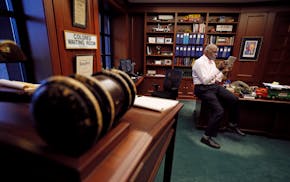Morristown, N.J. – A New Jersey judge has ordered Minnesota Vikings owners Zygi and Mark Wilf and their cousin, Leonard Wilf, to pay $84.5 million in damages to former business partners who sued them for fraud over a 1980s real estate deal.
The ruling covers compensatory and punitive damages to plaintiffs Josef Halpern and Ada Reichmann.
The damages awarded Monday did not include requests for more than $16 million in plaintiff's attorney and accounting fees, which could push the damages awarded to more than $100 million.
Superior Court Judge Deanne Wilson made the ruling Monday after finding, in a decision issued last month, that the Wilfs committed fraud, breach of contract and breach of fiduciary duty and also violated the state's civil racketeering laws in a partnership involving a 764-unit apartment complex in Montville, N.J.
Wilf attorney Peter Harvey said the Wilfs, who did not attend the hearing, were informed of the judge's decision. He declined to reveal their reaction, citing attorney-client privilege.
The ruling is not final because the Wilfs have 45 days to appeal, potentially delaying the awarding of damages and a referral of the case to the state attorney general or county prosecutors for possible criminal investigation.
Halpern declined to comment after the hearing. Reichmann, his sister and wife of a prominent Canadian developer, did not attend.
"What the Wilfs did in this case was abominable," said Halpern's attorney, Alan Lebensfeld, adding "they are sophisticated businessmen and they took advantage of my client."
The court case has been closely watched by the National Football League, Minnesota Gov. Mark Dayton and the Minnesota Sports Facilities Authority as negotiations on development agreements continue on the new $975 million Vikings stadium being financed by the team owners, the state and the city of Minneapolis.
The Wilfs hope to open the downtown Minneapolis stadium in time for the start of the 2016 football season. Groundbreaking is tentatively scheduled for early November.
The authority board is scheduled to vote on the stadium's use and development agreements at its Friday meeting.
An independent audit conducted for the authority and completed earlier this month found that the Wilfs have enough money to cover their share, roughly $477 million, of the stadium financing regardless of the ruling. Their contribution includes a $200 million NFL loan and revenue generated from stadium naming rights, sponsorships and licensing fees.
Harvey referred to Wilson's order as simply that — an order — that will have no bearing on the Wilfs' or the Vikings' ability to finance their portion of the new downtown stadium.
"The good news here, aside from the fact we believe this decision will not stand on appeal, is that nothing that the judge has decided will impact stadium construction," Harvey said.
Harvey estimated that the appeals process "will be easily two to three years," adding that "the stadium will be built and there will be an opening kickoff long before this case is decided."
The authority ordered the review of the Wilfs' finances in August at the urging of Dayton, who expressed concern that the New Jersey case and subsequent civil penalties could hamper the Wilfs' ability to cover stadium costs.
Days after the review revealed that the Wilfs had the financial wherewithal to pay for their share of the stadium, Dayton urged the authority to make sure that the owners contributed a "significant share" of their own equity to the project and not pass on steep fees to season-ticketholders in the form of "personal seat license" fees.
Seat licenses, which typically sell for an average of several thousand dollars, are paid for by fans on top of the cost of a season ticket and are often used by NFL teams to help pay for new stadium construction.
Rep. Bob Barrett, R-Lindstrom, a longtime critic of the stadium financing deal, referred to those fees Monday as he reacted to the ruling from New Jersey. He said that the Wilfs stand to generate so much revenue off seat license fees, stadium naming rights and other sponsorships that "it is highly likely that" the Wilfs "will actually make a profit" off the stadium's construction.
Barrett said the "enduring legacy" of the project "cannot be" that Minnesotans paid for a stadium so that the Wilfs "could use proceeds from their 'contribution' to pay off a $84 million judgment in the state of New Jersey."
Meanwhile, Vikings spokesman Lester Bagley said Monday that negotiations on lease and development agreements are "going very well" and that the team and authority are "working hard to keep the project on track."
Also on Monday, the state of Minnesota moved forward with plans to issue the bonds that will be used to cover the $498 million public share of the project.
NFL Commissioner Roger Goodell has assured the authority that the team will honor its commitment to building the stadium and playing in Minnesota, regardless of the outcome of the Wilf case, which has also led to high drama in New Jersey.
Net worth is next
Halpern and Reichmann sought upward of $50 million from the Wilfs, who they said used fraudulent bookkeeping practices to cheat them out of their share of revenues from Rachel Gardens, a 764-unit apartment complex in New Jersey.
Reichmann filed the initial suit in 1992 after the Wilfs removed her as a partner, arguing that she was no longer contributing to the development's cost. Halpern joined the suit in 2009.
Wilson ruled last month that Reichmann and Halpern were entitled to receive a 25 percent share of revenues from Rachel Gardens. Reichmann never received her share and Halpern didn't receive his 25 percent share after 1990.
Zygi Wilf must pay 60 percent, roughly $21 million, of the punitive damages while Mark and Leonard Wilf are responsible for 20 percent each, about $7.3 million each, the judge ruled. She did not determine how the compensatory damage payments will be divvied up.
"They've been punished sufficiently and fairly by the judge," Lebensfeld said.
As part of the lawsuit, Wilson also ruled that Zygi and Mark Wilf must disclose their personal wealth. She will not unseal the numbers until the Wilfs have a chance to appeal her decision, which they plan to do.
In court papers filed this month, Zygi Wilf said that making his net worth public could pose a threat to his family and negatively affect his business dealings. The Vikings owners have a stake in 460 businesses spread over 37 states.
Staff Writer Richard Meryhew contributed to this report.
Corey Mitchell is a correspondent in the Star Tribune Washington Bureau. Twitter: @C_C_Mitchell

The PWHL's growth comes with a price for a Minnesota Frost team building a potential dynasty.
What is the 'House settlement,' and what does it mean for the Gophers and NCAA?

Souhan: Anxiety and depression in the NFL helped inspire Lindsey Young's children's book

Reusse: Country boy Jim Marshall never lost his lust for life
